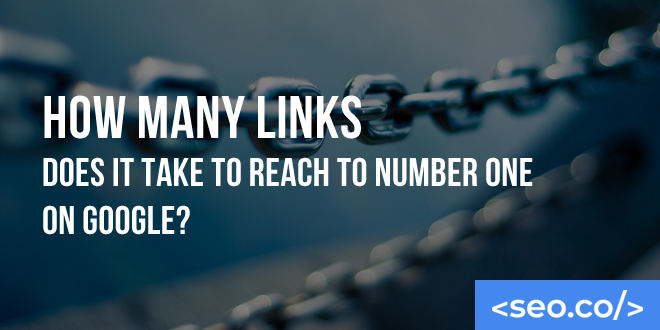A common question I hear from customers is:
“How many links will it take for me to reach the number one position in the search engines?”
While this question is common, it’s impossible to answer without knowing a bunch of variables that are extremely difficult to ascertain.
However, I think what the customer really wants to know is, “How much will it cost my company before I rank and start making money?”
Table of Contents
Know Your Competition
Before you can estimate how many new links that’ll take, you really need to understand and analyze your competition inner plates or both inner & outer plates. As most of us know, keyword competition can make the difference between ranking in a few weeks or years (or possibly, never). You can find out the strength of your competition by auditing their inbound link profile.
To start this process, do a quick search and take note of the top 10 websites ranking for that keyword. Once you have the list, use a tool like ahrefs.com to determine the quantity and quality of their backlinks.
Tip: Acquire their Best Links!
While you are working on your backlink analysis, take note of any particularly high-quality backlinks that you can obtain as well.
For instance, if your competitor acquired a link from VentureBeat.com by doing a guest blog post, that tells you that VentureBeat may be willing to entertain offers from guest bloggers.
Reach out and see if you can become a contributor there as well.
But, in most cases, acquiring backlinks without investing heavily in content is difficult or even nigh-to-impossible!
Now that we’ve discussed great ways to get a few extra high-quality links, why not round it out by looking at cheaper, easier alternatives?
What about $50 Link Packages?
Many of us have seen cheap backlink packages on certain forums. There are a number of different packages, but most of them have a set number of backlinks of various types for a price. How good of a deal are these backlinks?
When researching this article, I took a close look at some of the popular link packages that you can buy off of well-known forum software. Many of them offered similar deals. Some examples included tiered backlink packages, while others claimed to be “high PR” backlinks. Here are the results of my analysis:
Package #1 – Tiered Backlinks
In package number 1, you have a multi-tiered backlink package. The first tier had 2,000 article directory backlinks, 50 social bookmarks, and 50 web 2.0 links. For the second tier, they create 10,000 blog comments that point to the first tier. To avoid duplicate content and save money, all content is spun. You can have all of this for less than $50.
But what are you really getting when you buy these packages? Let’s assume for a moment that the vendors are legitimate and give you several hundred article backlinks all spun from the same text. I know from testing and experience that only a small percentage of those backlinks will actually get and stay indexed (links don’t benefit you if they aren’t indexed).
Furthermore, these types of more links are exactly what Google targets with its Penguin and Panda algorithms; buying these types of links is like setting ticking time bombs on the foundation of your SEO initiative.
Package #2 – High PR network links
In package number 2, I found a different approach. This package claims to allow you to purchase backlinks on the homepage of a website. These types of backlinks are typically more expensive and start at $130 per month.
The demise of link networks should teach us that these types of new links are dangerous, and untrustworthy and should be avoided. In April 2012, Google deindexed almost every site on the BMR network and continued to deindex entire new networks as well.
Now you may be thinking, “How could they possibly know about this network when there are so many?” The answer is fairly simple when you consider the new Google Disavow Tool. Every time a webmaster gets scared and disavows all purchased links, what happens to that list of sites? It’s possible that if enough people disavow purchased links then maybe they will be next on the deindex list.
Even if that doesn’t happen, with Google’s stance on web spam, these backlinks are more likely to cause harm than good, at least in the long run.
Link Velocity
While we’re talking about buying link packages and dumping tons of backlinks in a few days, let’s discuss link velocity.
Link velocity is the speed at which your website is gaining (or losing) backlinks. Many SEOs believe it to be a major factor that Google uses to determine web spam.
If the search engines see that your link velocity is going up and down because you’re buying link packages and getting 5,000 links one day and then none the rest of the month, it’s going to look very suspicious.
The Risk of Link Spam
Google is working diligently to deny the value of link spam. They are working on ways to “go upstream” and deny the value of spam links. They are also using new and different ways of performing link analysis to uncover these link schemes.
While some methods of link spam may still work today, it’s obvious from Cutts’ comments that Google is working diligently to remove any benefit. Some of these changes will come about in the new version of Penguin (2.0) which will be released “within the next few weeks” according to Cutts.
Give Google What It Wants
If you’re like most people who have done SEO for any period of time, you’re sick of hearing the old ‘quality over quantity’ argument when it comes to backlinks. Even so, many of us have seen that the right types of contextual links can prove to be the most valuable.
In general, the best way to get contextual links is to use sites that are in the same niche that you are in. These sites should have authority and will transfer some of that to your site.
Getting Help
By now, you probably realize that buying cheap link packages is not a good idea. One size does not fit all, and you need a plan that not only includes the right types of links but also takes into account proper link velocity.
The days of creating spun content and thousands of spammy links to achieve high rankings are over. However, you may not have the time or know-how to run your own successful campaign. Should you consider getting help?
What should you expect when you hire an SEO service? Will they deliver the same 5,000 backlinks that you could get from a forum community?
When you start with a professional SEO agency, one of the first things they will need to know is how your current on-page and off-page SEO is set up. Once a site analysis is done, you can then start making tweaks to your site and creating a link building plan.
Professional SEO audits typically start at around $2,000 depending on the size of your website. However, it can be beneficial to learn what you need to do in order to beat your competition in the rankings.
A typical white hat link building budget is going to cost between $1,000 and $5,000 per month. This range depends upon the quality and quantity of the links given.
So, How Many Links to Number One?
The question “how many links will it take to reach number one” is impossible to answer with a specific reasonable number. All links carry different value; one link from Mashable.com is probably worth 1,000 l inks from lesser-known websites. Sure, you can look at how fast your competition has obtained links in the past, but what about the future? Don’t worry about it.
All you need to do is get the highest-quality backlinks you can, at a quicker pace than your competitors. This, combined with a robust social media marketing initiative that includes a solid onsite content strategy, is the key to success.
Let’s face it folks, the days of buying a few random link packages and getting first page rankings as a result are over. The search engines have gotten better at ignoring these link schemes, and in some cases, are lowering the rankings of sites that still use them.
Getting high-quality links is now the name of the game. While some people will still buy link packages in the future, it’s the wrong path to establishing a solid future SEO foundation.
Want more information on link building? Head over to our comprehensive guide on link building here.
Tim holds expertise in building and scaling sales operations, helping companies increase revenue efficiency and drive growth from websites and sales teams.
When he's not working, Tim enjoys playing a few rounds of disc golf, running, and spending time with his wife and family on the beach...preferably in Hawaii.
Over the years he's written for publications like Forbes, Entrepreneur, Marketing Land, Search Engine Journal, ReadWrite and other highly respected online publications. Connect with Tim on Linkedin & Twitter.
- How to Rank for Local SEO in Multiple Locations - April 16, 2024
- SEO for Mass Tort Lawyers: Everything You Need to Know - April 3, 2024
- Natural Backlinks vs. Unnatural Backlinks: How to Build a Natural Link Profile - April 1, 2024




